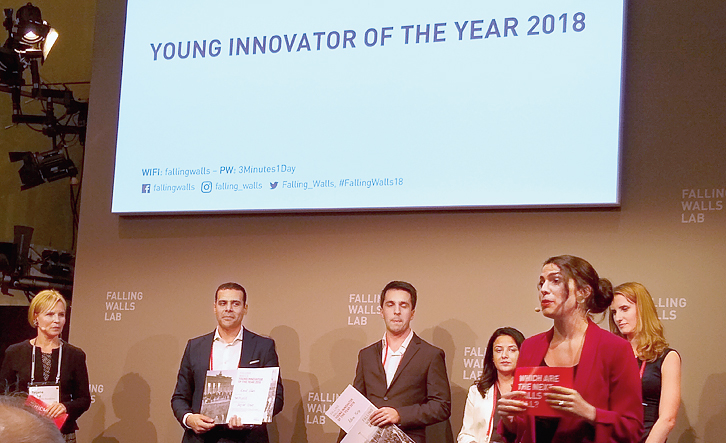The Falling Walls Young Innovator competition is part of a major science event that is held in Berlin, Germany, every year. The first Falling Walls was held to commemorate the 20th anniversary of the fall of the Berlin Wall. The two-day event showcases the research work of international scientists from a wide range of fields. This year celebrated the 10th anniversary of the science expo.
The winner of this year’s Young Innovator competition was Ahmed Ghazi, a young scientist originally from Bahrain but now working at the University of Rochester in New York, US. He was judged the best out of a pool of 100 young scientists from 56 countries.
Ghazi’s three-minute presentation on how to prevent errors in surgical practice was declared the best pitch by a jury drawn from science and industry, led by Professor Claudie Haignere, an astronaut and senior advisor to the director-general, European Space Agency, France. The researchers presented their innovations at the Akademie der Künste in Pariser Platz in central Berlin during the Falling Walls Lab (FWL). The three best are selected and funded for development.

The winner of this year’s Young Innovator competition Ahmed Ghazi. Ghazi’s three-minute presentation on how to prevent errors in surgical practice was declared the best pitch. Chandana Chandra
Every year, hundreds of thousands of people lose their lives during surgery. Ghazi is on a mission to minimise the number of deaths caused by surgical errors. Taking the airspace industry and their simulators as an example, he’s come up with a way to replicate body parts out of silicon or fibreglass, using 3D printing technology. This will give surgeons much-needed practise and reduce errors.
The technology, called SIMPLE (simulated inanimate model for a physical learning experience), has become part of surgical training at the University of Rochester School of Medicine and Dentistry. “What we have created is a model that looks, feels and reacts like a live organ and allows trainees and surgeons to replicate the same experience they would face in the operating room,” said Ghazi at the presentation. This has led to not only better surgical results but also reduced healthcare costs, shorter hospital stays and fewer return visits by patients.
“We were impressed by Ahmed Ghazi’s idea because it can save many lives across the world,” said Haignere while announcing the winners. Joybrato Mukherjee, vice-president of DAAD, Germany, and jury member of FWL said, “We selected three winners based on breakthrough potential of the idea, impact of the innovation on society, quality of presentation and the participants’ ability to answer questions from the jury and audience.”
The second prize went to Adam Fulop of the Budapest Institute of Technology (BME) in Hungary, who is trying to improve Braille literacy. “We’ve developed a tactile feedback device which lets blind people read any printed text as Braille,” he said.

Third prize winner Ankita Poudyal from Nepal, who was representing the Auckland University of Technology in New Zealand, has innovated a more efficient air filter. Chandana Chandra
The third prize went to Ankita Poudyal from Nepal, who was representing the Auckland University of Technology in New Zealand. She has innovated a more efficient air filter. “We are using synthetic molecules to modify nano-fibre filters to improve air-flow and reduce the amount of harmful particles getting into our lungs,” the young scientist explained. The technology can also be used to purify water.
Among the Indian representatives was Anisha Krishna Kumar from the National Institute of Technology at Warangal, Telangana, with her smart bra that can warn women if they develop breast cancer. “In India, talking about breast cancer is kind of taboo, so women hesitate to see a doctor. As a result, there’s an inordinate delay in treatment and a bad prognosis,” she said.
Tatjana Koenig, managing director, Falling Walls Foundation, said, “We are thrilled by the quality of ideas at FWL and the passion that their proponents have for solving the world’s most perplexing problems.” She’s certain that many of the scientists and projects showcased here have the potential to change our world.











